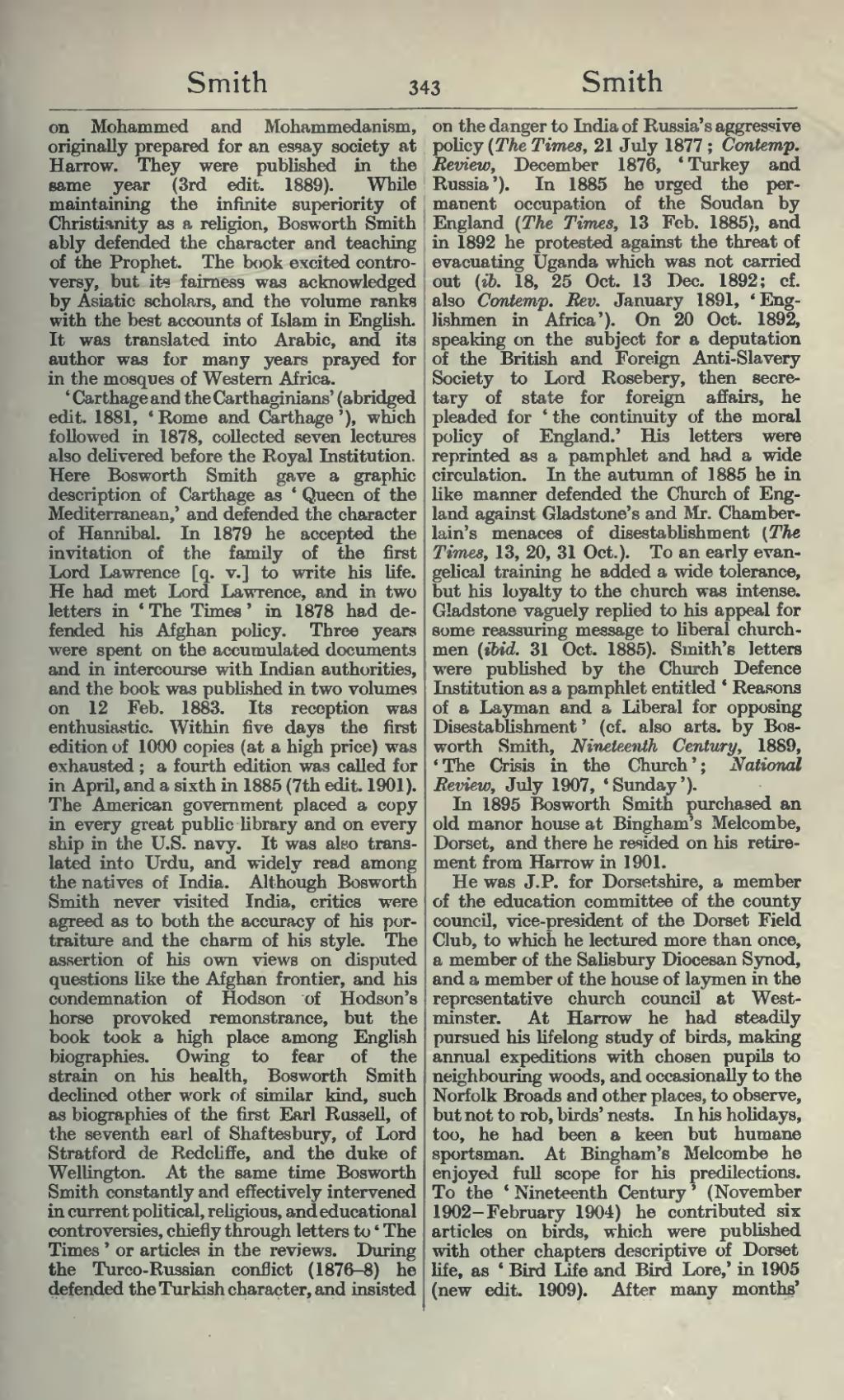on Mohammed and Mohammedanism, originally prepared for an essay society at Harrow. They were published in the same year (3rd edit. 1889). While maintaining the infinite superiority of Christianity as a religion, Bosworth Smith ably defended the character and teaching of the Prophet. The book excited controversy, but its fairness was acknowledged by Asiatic scholars, and the volume ranks with the best accounts of Islam in English. It was translated into Arabic, and its author was for many years prayed for in the mosques of Western Africa.
'Carthage and the Carthaginians' (abridged edit. 1881, 'Rome and Carthage'), which followed in 1878, collected seven lectures also delivered before the Royal Institution. Here Bosworth Smith gave a graphic description of Carthage as 'Queen of the Mediterranean,' and defended the character of Hannibal. In 1879 he accepted the invitation of the family of the first Lord Lawrence [q. v.] to write his life. He had met Lord Lawrence, and in two letters in 'The Tunes' in 1878 had defended his Afghan policy. Three years were spent on the accumulated documents and in intercourse with Indian authorities, and the book was published in two volumes on 12 Feb. 1883. Its reception was enthusiastic. Within five days the first edition of 1000 copies (at a high price) was exhausted; a fourth edition was called for in April, and a sixth in 1885 (7th edit. 1901). The American government placed a copy in every great public library and on every ship in the U.S. navy. It was also translated into Urdu, and widely read among the natives of India. Although Bosworth Smith never visited India, critics were agreed as to both the accuracy of his portraiture and the charm of his style. The assertion of his own views on disputed questions like the Afghan frontier, and his condemnation of Hodson of Hodson's horse provoked remonstrance, but the book took a high place among English biographies. Owing to fear of the strain on his health, Bosworth Smith declined other work of similar kind, such as biographies of the first Earl Russell, of the seventh earl of Shaftesbury, of Lord Stratford de Redcliffe, and the duke of Wellington. At the same time Bosworth Smith constantly and effectively intervened in current political, religious, and educational controversies, chiefly through letters to 'The Times' or articles in the reviews. During the Turco-Russian conflict (1876-8) he defended the Turkish character, and insisted on the danger to India of Russia's aggressive policy (The Times, 21 July 1877; Contemp. Review, December 1876, 'Turkey and Russia'). In 1885 he urged the permanent occupation of the Soudan by England (The Times, 13 Feb. 1885), and in 1892 he protested against the threat of evacuating Uganda which was not carried out (ib. 18, 25 Oct. 13 Dec. 1892; cf. also Contemp. Rev. January 1891, 'Englishmen in Africa'), On 20 Oct. 1892, speaking on the subject for a deputation of the British and Foreign Anti-Slavery Society to Lord Rosebery, then secretary of state for foreign affairs, he pleaded for 'the continuity of the moral policy of England.' His letters were reprinted as a pamphlet and had a wide circulation. In the autumn of 1885 he in like manner defended the Church of England against Gladstone's and Mr. Chamberlain's menaces of disestablishment (The Times, 13, 20, 31 Oct.). To an early evangelical training he added a wide tolerance, but his loyalty to the church was intense. Gladstone vaguely replied to his appeal for some reassuring message to liberal churchmen (ibid. 31 Oct. 1885). Smith's letters were published by the Church Defence Institution as a pamphlet entitled 'Reasons of a Layman and a Liberal for opposing Disestablishment' (cf. also arts, by Bosworth Smith, Nineteenth Century, 1889, 'The Crisis in the Church'; National Review, July 1907, 'Sunday').
In 1895 Bosworth Smith purchased an old manor house at Bingham's Melcombe, Dorset, and there he resided on his retirement from Harrow in 1901.
He was J.P. for Dorsetshire, a member of the education committee of the county council, vice-president of the Dorset Field Club, to which he lectured more than once, a member of the Salisbury Diocesan Synod, and a member of the house of laymen in the representative church council at Westminster. At Harrow he had steadily pursued his lifelong study of birds, making annual expeditions with chosen pupils to neighbouring woods, and occasionally to the Norfolk Broads and other places, to observe, but not to rob, birds' nests. In his holidays, too, he had been a keen but humane sportsman. At Bingham's Melcombe he enjoyed full scope for his predilections. To the 'Nineteenth Century' (November 1902-February 1904) he contributed six articles on birds, which were published with other chapters descriptive of Dorset life, as 'Bird life and Bird Lore,' in 1905 (new edit. 1909). After many months'
